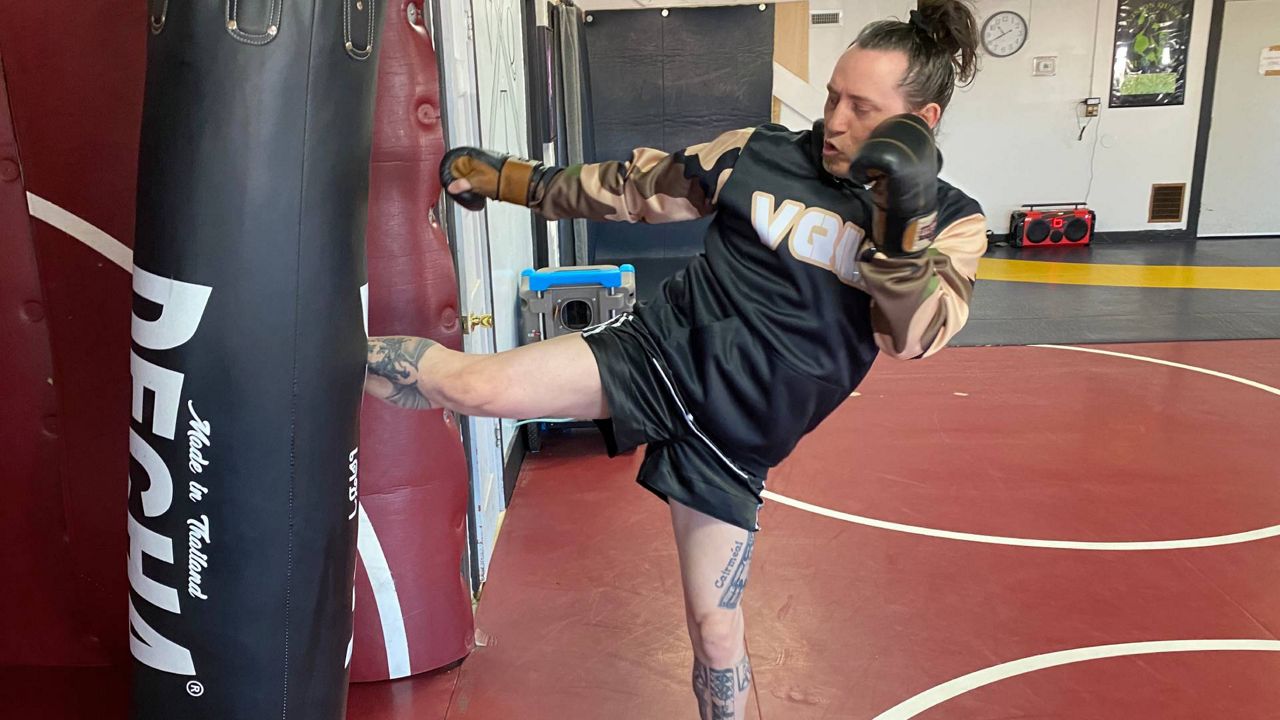New legislation legalizing competitions in the combat sport of Muay Thai in Maine is welcome news for Primo Bellarosa.
The New York native living in Corinna runs Vision Quest Muay Thai, a space in Pittsfield where he trains about 75 students in the martial art, some coming from south of Augusta or as far away as the Acadia region.
Rep. Amanda Collamore (R-Pittsfield) has sponsored a bill defining Muay Thai and kickboxing, a more generic form of the art. The bill is working its way through committee but if it passes, Collamore said, it will allow for properly regulated competitions for both arts in Maine.
“In order for that to happen, definitions for those two types of full-combat combat sports need to be added to our laws governing mixed martial arts and boxing,” Collamore said in a statement.
Muay Thai today is the national sport of Thailand and is based on centuries-old fighting techniques developed by the military. It gained widespread popularity in the U.S. following the release of action films such as “Bloodsport” and “Kickboxer” in the late 1980s.
To the casual observer, it resembles boxing with kicks, knees and elbows.
Bellarosa has been running the gym in Pittsfield since December, after moving from another studio he operated in Newport for two and a half years. His current gym has a mostly padded floor, with heavy, black bags hanging in wait for the next trainee.
The walls are adorned with framed memorabilia such as shorts and boxing gloves. They hearken to Bellarosa’s fighting days, when he was a member of Team USA, a national Muay Thai competition team.
When asked his age, he grinned and said, “Old enough to have had 60 fights and own my own business.”
Of those fights, Bellarosa said, he only lost two.
His secret?
“Just hard work. Honestly, put the work in,” he said.
That work ethic defines his business and study of Muay Thai in general, Bellarosa said. Despite the militant history of the art, he and his students see it as a sport.
“It’s an art,” said Ryan Sanders, 35, of Etna, one of Bellarosa’s students. “It really is an art. It’s not violence. It’s a dance.”
Sanders said fighting competitively is a part of him.
“I was just born to fight. I can’t sing. I can’t dance, but I can fight,” he said.
Sanders added, however, that he is not a violent person. In fact, he said, he has never been in a street fight his entire adult life.
Since he started studying Muay Thai, he said, he has become less aggressive outside the gym.
“When you know who you are, you don’t have to go and be a tough guy,” he said.
Bellarosa said the Pittsfield gym is a far cry from the one he co-owned in Brooklyn with 200 students, but he said he has 15-25 people in his classes, and plenty of those students want to compete.
Without rules for Muay Thai tournaments in Maine, he said, his students can only participate in national events in other states, and locally in more general mixed martial arts tournaments.
“If I want my guys to compete, that’s the avenue of competition that’s open to us right now,” he said.
Bellarosa said the state has rules on the books governing some martial arts, but disciplines such as boxing and MMA are considered “combat sports,” and were later added with their own rules. He suspects arts such as Muay Thai were left out only because regulators didn’t think of them at the time.
At a public hearing this week in Augusta discussing Collamore’s bill, Bellarosa said there was no opposition, which reinforced his opinion.
“I don’t think people said ‘We don’t want this.’ It just wasn’t put in,” he said.
Ultimately, Bellarosa said he hopes state-sanctioned tournaments will drive interest in the art he has come to love.
“I want to be able to give the lessons that I learned to my students,” he said.





)


